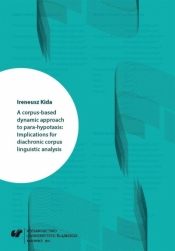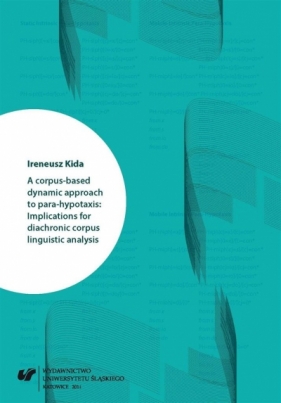A corpus-based dynamic approach to para...
Opis
Przedstawiona monografia wpisuje się w dziedzinę diachronicznego językoznawstwa korpusowego i jest wynikiem badań koncentrujących się na poszukiwaniu nowych narzędzi korpusowych w celu rozwiązania problemu ambiwalencji zdań parahipotaktycznych w języku staroangielskim. Poszukiwania te zaowocowały stworzeniem aparatu badawczego pozwalającego na systematyczne wyszukiwanie, klasyfikację, opis i automatyczną analizę tych struktur przy użyciu konkretnego korpusu językowego. W literaturze przedmiotu funkcjonowało do tej pory kilka definicji parahipotaksy, które nie utożsamiałyjej z ambiwalencją, podczas gdy w niniejszej monografii utożsamienie takie stanowi sprawę kluczową. Autor dokonał wstępnej klasyfikacji ambiwalentnych zdań parahipotaktycznych oraz opisał zbudowany przez siebie korpus do ich podwójnej analizy. W rozdziale trzecim, czwartym i piątym pracy omówione zostały natomiast odmienne rodzaje parahipotaksy, odpowienio SIPH, MIPH oraz EPH. Dzięki lekturze monografii Ireneusza Kidy, czytelnicy mogą dowiedzieć się, jak wiele zależy od sposobu traktowania zdań parahipotaktycznych - z jednej strony jako zdania główne (niezależne, równorzędne), a z drugiej jako podrzędne. This monograph inscribes itself in the field of diachronic corpus linguistics and is the result of research focused on finding new corpus tools for solving the problem of the ambivalence of parahypotactic clauses in Old English. The efforts resulted in the creation of a research apparatus allowing for systematic search, classification, description and automatic analysis of these structures on the basis of a specific corpus. In the literature there have been several definitions of parahypotaxis but they have not identified it with ambivalence, while in this monograph it happens so and it is the key issue. The author has performed a preliminary classification of ambivalent parahypotactic clauses and he has described a corpus which he compiled for their dual analysis. In the third, fourth and fifth chapter, a detailed description of ambivalent parahypotactic clauses, respectivelySIPH, MIPH and EPH, takes place. In each of them different types of parahypotaxis are of concern. A reader of the monograph by Ireneusz Kida will surely appreciate how much depends on the way parahypotactic clauses are treated - on the one hand as main and on the other as dependent clauses; in this monograph, the concept main is used also in the sense of independent or coordinate.
Szczegóły


Recenzje